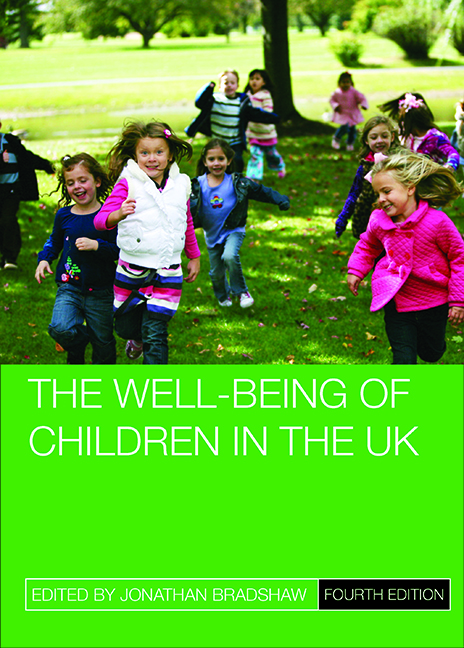Book contents
- Frontmatter
- Contents
- List of figures and tables
- List of abbreviations
- Notes on contributors
- Acknowledgements
- One Introduction
- Two Demography of childhood
- Three Child poverty and deprivation
- Four Physical health
- Five Subjective well-being and mental health
- Six Education
- Seven Housing and the environment for children
- Eight Children’s time and space
- Nine Children and young people in care and leaving care
- Ten Child maltreatment
- Eleven Childcare and early years
- Twelve Children, crime and correction
- Thirteen Conclusion
- Bibliography
- Index
Thirteen - Conclusion
Published online by Cambridge University Press: 01 September 2022
- Frontmatter
- Contents
- List of figures and tables
- List of abbreviations
- Notes on contributors
- Acknowledgements
- One Introduction
- Two Demography of childhood
- Three Child poverty and deprivation
- Four Physical health
- Five Subjective well-being and mental health
- Six Education
- Seven Housing and the environment for children
- Eight Children’s time and space
- Nine Children and young people in care and leaving care
- Ten Child maltreatment
- Eleven Childcare and early years
- Twelve Children, crime and correction
- Thirteen Conclusion
- Bibliography
- Index
Summary
This new edition of The well-being of children in the UK provides a more up-to-date picture of children's lives. The previous edition (published in 2011) contained data only up to 2010 – most of that was for the period before the start of the global economic crisis in 2008, and all of it was before the election of the coalition government in 2010 and the rolling out of austerity measures.
Now, in 2015, we are able to present a more modern picture and perhaps a picture that provides a more positive image of the impact of the Labour government during 1997-2010 and the beginnings of the impact of the coalition government during 2010-15.
We focus on two aspects of the evidence here: the comparative evidence and the evidence about trends.
What is the comparative evidence?
Is life good for children in the UK? One important piece of evidence is how they are doing in comparison with children elsewhere. Unless we know how we stand comparatively, we cannot know how good we could be – or even if we are better than we were.
Comparative evidence has been drawn on in the separate chapters of this book, and so a summary is presented here.
The UNICEF (2007) Innocenti Report Card no 7 had the UK at the bottom of 21 countries on overall well-being, and:
• 18th on material well-being
• 12th on health and safety
• 17th on education
• 21st on family and peer relations
• 21st on behaviour and risks
• 20th on subjective well-being.
The Bradshaw and Richardson (2009) comparisons of the EU29 countries ranked the UK 24th out of 29 countries on overall wellbeing, and:
• 24th on health
• 21st out of 28 on subjective well-being
• 15th out of 28 on relationships
• 24th out of 26 on material well-being
• 18th out of 28 on risk behaviour
• 22nd out of 27 on education
• 17th out of 26 on housing.
Although the OECD (2009a) did not produce a league table, it is easy to estimate one. The UK ranked 20th out of 30 OECD countries on overall well-being, and:
• 12th on material well-being
• 15th out 27 on housing and the environment
• 22nd on education
• 20th on health and safety
• 28th on risk behaviour
• 4th out of 25 on quality of school life.
- Type
- Chapter
- Information
- The well-being of children in the UK (4th edition) , pp. 347 - 358Publisher: Bristol University PressPrint publication year: 2011



